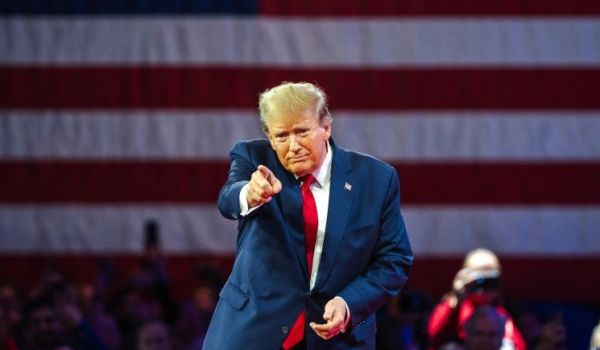Donald Trump likes tariffs, but they damage the economies of everyone involved
- Applied Institute for Research in Economics

This article was originally published on The Conversation on 31 March 2025.
<p>Donald Trump <a href="https://www.forbes.com/sites/dereksaul/2025/03/25/trump-says-hell-be-lenient-on-reciprocal-tariffs-heres-what-to-know-as-liberation-day-looms/">is calling</a> April 2 2025 “Liberation Day”. For the rest of the world it will just be the day when they discover the details of his latest round of tariffs.</p>
<p>Those tariffs have already become the stand out <a href="https://www.piie.com/blogs/realtime-economics/2025/trumps-trade-war-timeline-20-date-guide">economic feature</a> of Trump’s second term in the White House. And frankly, it’s been hard to keep track. </p>
<p>There have been tariffs imposed and then lifted, tariffs with exemptions, tariffs on metal and tariffs on wood. Now Trump has announced a <a href="https://www.reuters.com/business/autos-transportation/auto-industry-rocked-by-trumps-25-tariffs-us-imports-2025-03-27/">25% tariff</a> on all imported cars to take effect on April 2, when he also plans to reveal his <a href="https://www.whitehouse.gov/articles/2025/02/reciprocal-trade-and-tariffs/">“reciprocal tariffs”</a> on other trading partners. </p>
<p>Trump <a href="https://globalnews.ca/news/11066760/donald-trump-tariffs-congress-speech/">thinks</a> the US has been “ripped off for decades by nearly every country on Earth”. He also counts “tariff” as his favourite word, and <a href="https://www.ft.com/content/7da5d310-917f-4ac5-b1cd-99d9beab9239">a tool</a> which is “"very powerful, both economically and in getting everything else you want”. </p>
<p>Whether or not the president gets everything he wants remains to be seen. But the frequent changes in tariff policies over the past few weeks have definitely created uncertainty in trade with the US, which research shows can be <a href="https://www.sciencedirect.com/science/article/pii/S1062976920301113?via%3Dihub">harmful in itself</a>.</p>
<p>And the <a href="https://onlinelibrary.wiley.com/doi/full/10.1111/twec.12986">evidence</a> clearly shows that the reasons for the US trade deficit are more to do with domestic issues such as productivity and fiscal discipline than international trade. </p>
<p>So what are the possible outcomes if Trump continues to pursue this policy?</p>
<h2>The worst case</h2>
<p><a href="https://papers.ssrn.com/sol3/papers.cfm?abstract_id=5169795">Our analysis</a> shows that in the worst-case scenario, non-reciprocated tariffs on Canada and Mexico could result in a significant fall in GDP for all three countries. Canada would be the worst affected (a dip of 16.5%) followed by Mexico (6.6%). GDP in the US would fall by 0.19%. </p>
<p>Canada is particularly dependent on selling its oil and gas – and the US is <a href="https://edconway.substack.com/p/america-still-needs-canadian-oil">heavily reliant</a> on its northern neighbour for its fuel supply. In 2024, total trade between the two nations reached <a href="https://ustr.gov/countries-regions/americas/canada">US$762.1 billion</a> (£589 billion).</p>
<p>The impact on Mexico would also be devastating. Over 40% of the country’s GDP is derived from exports – and <a href="https://www.atlanticcouncil.org/blogs/beyond-the-border/beyond-the-border-your-briefing-on-us-mexico-commerce/">80% of those exports</a> go to the US. </p>
<p>High tariffs and subsequent retaliations would quickly reduce the confidence of companies on <a href="https://www.nytimes.com/live/2025/03/04/us/tariffs-us-canada-mexico-china/a-global-trade-war-raises-fears-of-higher-inflation-and-slower-growth?smid=url-share">both sides</a>. Costs <a href="https://www.aeaweb.org/articles?id=10.1257%2Fjep.33.4.187&ref=aussienomics.com">passed on to consumers</a> would reduce demand and then profits, forming a vicious cycle of <a href="https://www.bbc.co.uk/news/articles/cgr21jjwg4wo">economic recession</a>. Trade protectionism could then rise further, potentially even turning a recession into a <a href="https://www.focus-economics.com/blog/effects-of-trade-protectionism-on-economy/#:%7E:text=A%20historical%20example%20is%20the,and%20worsening%20the%20economic%20downturn.">depression </a></p>
<h2>Middle ground</h2>
<p><a href="https://papers.ssrn.com/sol3/papers.cfm?abstract_id=5169795">We also found</a> that even if the economic effects of tariffs were less severe, no nation involved would manage to achieve GDP growth. And Canada and Mexico would still suffer the most.</p>
<p>In this situation, some kind of stalemate could emerge, where tariffs lead to <a href="https://www.devere-group.com/fed-says-trump-tariffs-will-dent-the-economy/">rising inflation</a>, reducing the political appetite for escalation. Trade friction would likely continue until 2026, when a renegotiation of the <a href="https://www.congress.gov/crs-product/IF10997">trade agreement</a> between the US, Mexico and Canada is due to take place.</p>
<h2>Best case</h2>
<p>Even under the best-case scenario, with reduced economic impact, GDP for all three countries still falls. Put simply, imposing tariffs <a href="https://www.macrothink.org/journal/index.php/ber/article/view/22185">creates no winners</a>. </p>
<p>Since the tariff has been seen as <a href="https://www.politico.eu/article/trump-threatens-mega-200-percent-tariff-on-eu-wines-and-spirits/">a bargaining chip</a>, the best option for Canada and Mexico will be to enter trade negotiations with the US, aiming for a balanced trade policy that is beneficial to all parties.</p>
<p>In the meantime, they should cooperate with other economies affected by US tariffs – such as the EU and China – in the hope that this encourages Trump to make concessions. </p>
<p>All three countries could then revert to their original low-tariff levels before the trade war. This constitutes the optimal scenario within our projected framework – and could be what happens eventually.</p>
<p>US treasury secretary, Scott Bessent, has <a href="https://www.reuters.com/business/finance/us-treasurys-bessent-says-fsoc-will-drive-regulatory-change-outlines-tariff-2025-03-06/">said</a> that Trump’s second favourite word is “reciprocal”. If that’s true, then it is possible that the Trump administration has the overall intention of cooling down the intensity of this trade war ahead of negotiating a new version of its trade deal with Canada and Mexico – and a new one with China too.<!-- Below is The Conversation's page counter tag. Please DO NOT REMOVE. --><img src="https://counter.theconversation.com/content/252322/count.gif?distributor=republish-lightbox-basic" alt="The Conversation" width="1" height="1" style="border: none !important; box-shadow: none !important; margin: 0 !important; max-height: 1px !important; max-width: 1px !important; min-height: 1px !important; min-width: 1px !important; opacity: 0 !important; outline: none !important; padding: 0 !important" referrerpolicy="no-referrer-when-downgrade" /><!-- End of code. If you don't see any code above, please get new code from the Advanced tab after you click the republish button. The page counter does not collect any personal data. More info: https://theconversation.com/republishing-guidelines --></p>
<p><span><a href="https://theconversation.com/profiles/muhammad-ali-nasir-1244347">Muhammad Ali Nasir</a>, Associate Professor in Economics, <em><a href="https://theconversation.com/institutions/university-of-leeds-1122">University of Leeds</a></em>; <a href="https://theconversation.com/profiles/kausik-chaudhuri-1253555">Kausik Chaudhuri</a>, Professor in Applied Econometrics, <em><a href="https://theconversation.com/institutions/university-of-leeds-1122">University of Leeds</a></em>, and <a href="https://theconversation.com/profiles/xinxin-wei-2346458">Xinxin Wei</a>, PhD Candidate in Economics, <em><a href="https://theconversation.com/institutions/university-of-leeds-1122">University of Leeds</a></em></span></p>
<p>This article is republished from <a href="https://theconversation.com">The Conversation</a> under a Creative Commons license. Read the <a href="https://theconversation.com/donald-trump-likes-tariffs-but-they-damage-the-economies-of-everyone-involved-252322">original article</a>.</p>
</div>
Contact us
If you would like to get in touch regarding any of these blog entries, please contact:research.lubs@leeds.ac.uk
Click here to view our privacy statement. You can repost this blog article, following the terms listed under the Creative Commons Attribution-NonCommercial-NoDerivatives 4.0 International licence.
The views expressed in this article are those of the author and may not reflect the views of Leeds University Business School or the University of Leeds.

